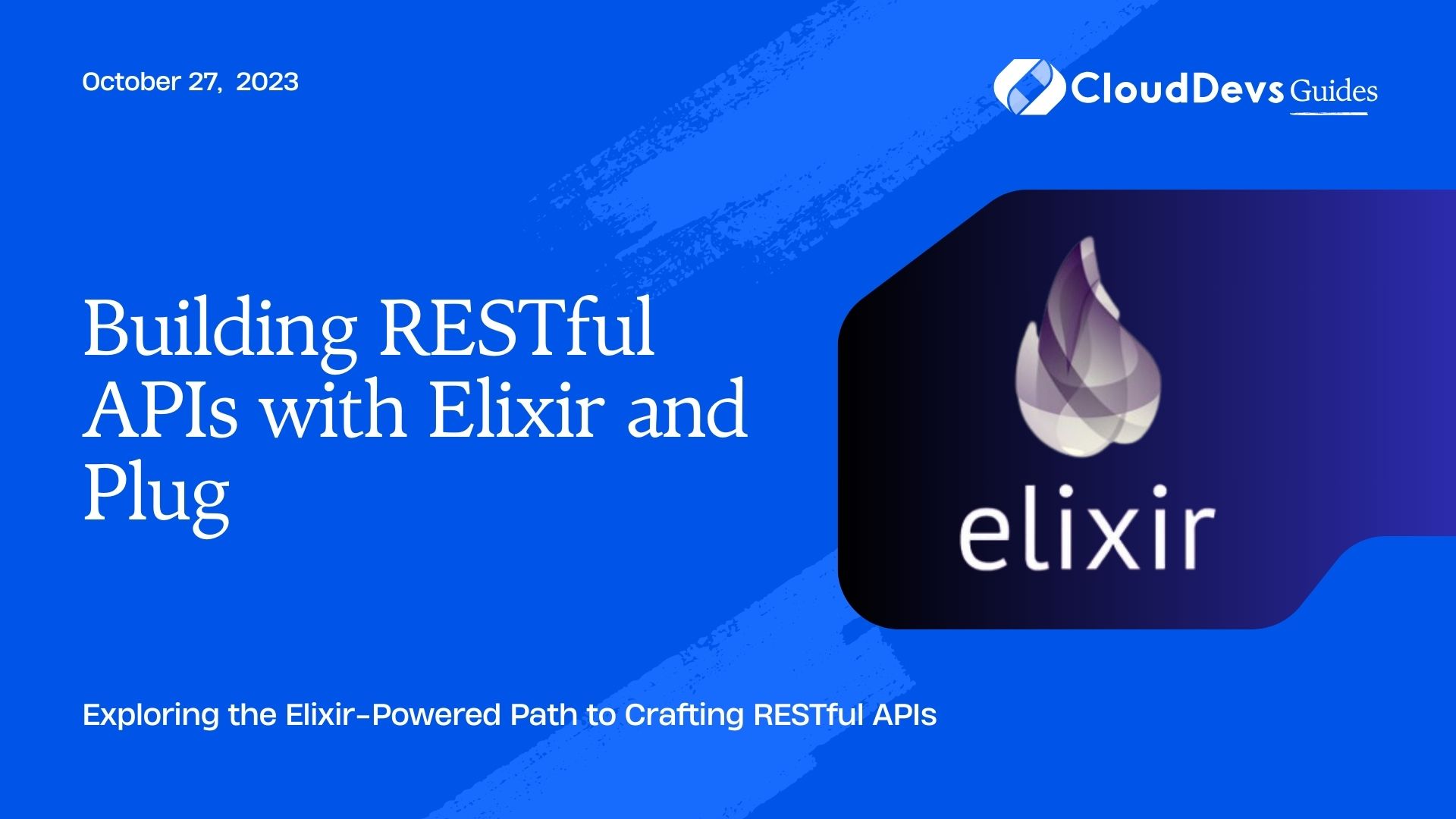Building RESTful APIs with Elixir and Plug
In the world of web development, creating robust and efficient APIs is a fundamental skill. RESTful APIs have become the de facto standard for building these interfaces due to their simplicity and scalability. Elixir, a functional programming language known for its concurrency and fault-tolerance capabilities, offers an exceptional environment for crafting RESTful APIs. In this article, we’ll dive into the Elixir landscape and explore how to leverage the Plug library to build RESTful APIs that are both powerful and maintainable.
1. Why Elixir for RESTful APIs?
Elixir’s unique blend of functional programming and fault tolerance makes it an excellent choice for building APIs. Its lightweight processes, also known as actors, enable high concurrency while maintaining system stability. In addition, the Elixir ecosystem boasts libraries that simplify API development, with Plug being a standout choice.
2. Understanding Plug: The Backbone of Elixir Web Applications
At the heart of most Elixir web applications, including APIs, is the Plug library. Plug is a specification and set of conventions for composable web modules in Elixir. It provides a foundation for building HTTP middleware and request/response handling, making it an ideal choice for crafting RESTful APIs.
3. Setting Up a New Elixir Project
To get started, ensure you have Elixir installed on your system. You can create a new Elixir project using Mix, the Elixir build tool.
shell mix new MyApiProject --module MyApiProject cd MyApiProject
4. Adding Plug to the Project
Add Plug as a dependency in your project’s mix.exs file:
elixir
defp deps do
[
{:plug, "~> 1.11"}
]
end
After adding the dependency, fetch and compile the new dependency:
shell mix deps.get
5. Creating a Basic Plug Pipeline
Plug introduces the concept of pipelines, a series of plugs that process incoming requests and outgoing responses. Let’s create a basic pipeline that logs incoming requests:
elixir
defmodule MyApiProject.MyPlugPipeline do
import Plug.Conn
def init(opts), do: opts
def call(conn, _opts) do
conn
|> put_resp_header("x-api-version", "1.0")
|> IO.inspect(label: "Incoming Request")
end
end
In this code, we define a module MyApiProject.MyPlugPipeline that uses the Plug.Conn module. The call/2 function is the entry point for our plug and is where we manipulate the connection. We add a response header and then use IO.inspect/2 to log the incoming request.
6. Creating a Basic Router
Now that we have a basic pipeline, let’s create a router to route incoming requests to appropriate plugs. Create a module named MyApiProject.Router:
elixir defmodule MyApiProject.Router do use Plug.Router plug MyApiProject.MyPlugPipeline # Define routes here end
7. Defining Routes and Handling Requests
Let’s define some routes and use plugs to handle requests. For example, let’s create a route to handle a GET request to “/api/users”:
elixir defmodule MyApiProject.Router do use Plug.Router plug MyApiProject.MyPlugPipeline get "/api/users", do: send_resp(conn, 200, "List of users") end
In this code, when a GET request is made to “/api/users”, the send_resp/3 function sends a 200 OK response with the message “List of users”.
8. Parameter Handling and Dynamic Routes
RESTful APIs often require handling dynamic parameters in URLs. Let’s create a dynamic route that handles GET requests for a specific user ID:
elixir
defmodule MyApiProject.Router do
use Plug.Router
plug MyApiProject.MyPlugPipeline
get "/api/users", do: send_resp(conn, 200, "List of users")
get "/api/users/:id", do: show_user(conn)
defp show_user(conn) do
id = conn.params["id"]
send_resp(conn, 200, "Showing user with ID #{id}")
end
end
In this example, the “:id” parameter is captured and accessed using conn.params[“id”].
9. Creating a JSON API Response
Most APIs respond with JSON data. To handle this, we can create a plug that serializes data into JSON format:
elixir
defmodule MyApiProject.JsonResponsePlug do
import Plug.Conn
def init(opts), do: opts
def call(conn, _opts) do
conn
|> put_resp_header("content-type", "application/json")
|> send_resp(200, Jason.encode!(%{message: conn.resp_body}))
end
end
Add this plug to the pipeline and use it in your router:
elixir defmodule MyApiProject.Router do use Plug.Router plug MyApiProject.MyPlugPipeline plug MyApiProject.JsonResponsePlug # Define routes here end
10. Error Handling
Error handling is a crucial aspect of API development. Let’s create a plug that handles errors and sends appropriate responses:
elixir
defmodule MyApiProject.ErrorHandlerPlug do
import Plug.Conn
def init(opts), do: opts
def call(conn, _opts) do
try do
conn
rescue
_exception ->
send_resp(conn, 500, "Internal Server Error")
end
end
end
Use the error handler plug in your router:
elixir defmodule MyApiProject.Router do use Plug.Router plug MyApiProject.MyPlugPipeline plug MyApiProject.JsonResponsePlug plug MyApiProject.ErrorHandlerPlug # Define routes here end
Conclusion
Building RESTful APIs with Elixir and Plug opens up a world of possibilities for creating performant and maintainable interfaces. Elixir’s functional programming paradigm and concurrency model align seamlessly with the demands of modern APIs, while the Plug library provides an elegant way to handle HTTP requests and responses. Armed with this knowledge, you’re well-equipped to embark on your journey of crafting powerful, efficient, and resilient RESTful APIs using the Elixir programming language.
Table of Contents









